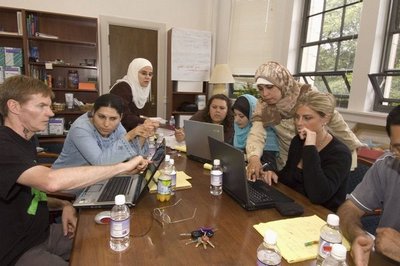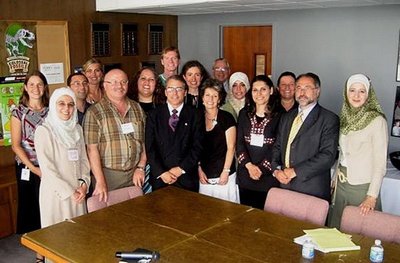October 25, 2007
College of Education sponsors mind-expanding, culture-bridging teacher exchange with Jordan
What began as a meeting of cultures and teaching styles grew into a connection of minds and hearts this summer when Seattle-area educators met, studied with and befriended counterparts from the country of Jordan, and then visited Jordan themselves.
The six-week teacher exchange partnership — three in the U.S. and three in Jordan — came from an initiative between the UW College of Education and the Jordanian Education Trust. Its stated aims were to further international understanding and to share in professional development activities, and the program certainly achieved those goals.
But participants from both sides of the globe who shared time, talents and living space together in the summer say the project did more than open professional doors — it opened minds, and created a cross-cultural experience few of them will soon forget.
The exchange seminar was organized by Mimi Heggelund, international coordinator for the College of Education. Five Washington state teachers participated, three from Seattle and two from Renton. From Seattle were Tina Anima, a sixth-grade social studies teacher from McClure Middle School and Kevin Gallagher, a kindergarten teacher from Bryant Elementary. From Renton came Michelle Luders and Vivek Srivastava, who teach third grade and first grade, respectively, at Kennydale Elementary; and Marvice Thornton, a math teacher from Dimmit Middle School.
The Jordanians were Maha Alshakhshir, Hanan Abdalla Eid, Abeer Alhamad, Sana’ Al Reiahy and Mawiyah Alhalasa, each representing a different part of Jordan. Both sets of teachers were chosen for their excellence in the classroom. The Americans were selected by the College of Education, and their Jordanian counterparts were each recipients of Queen Rania of Jordan’s Excellence Award for teaching.
Gallagher of Bryant Elementary, in Seattle’s Ravenna neighborhood, had high praise for his Jordanian counterparts. “They were chosen to receive this award for astoundingly good reasons,” he said. “They are among the leaders in the country, teaching in the classroom and moving the country forward.”
He said the cross-cultural trip was mind-expanding, and about more than just education — it crossed cultural, linguistic and religious borders as well as professional.
“I tell people I come back a changed man in many different levels. That part of the world will never be the same for me … I know what (the people there) look like and talk like and eat like, and how kind they were to me.”
The feelings were mutual. Jordanian teacher Sana’ Al Reiahy remembered in an e-mail, “We share(d) everything together — feelings, emotions, thoughts, beliefs and knowledge. They became my family there and a part of my life. They touched my soul and my heart, they left me with unforgettable memories.”
Both visits — the Jordanians to the U.S. and the Americans to Jordan — focused on education but also included visits to several cultural sites. Here in Washington state, the Jordanian teachers sat in on seminars presented by the UW’s LIFE Center (short for Learning in Informal and Formal Environments) and spent time at the IslandWood environmental learning center on Bainbridge Island. They also had educational visits to the Pacific Science Center and the Seattle Aquarium.
Referring to the visits to the Science Center and the Aquarium, Abeer Alhamad recalled in an e-mail, “It was amazing to me to see how the children educational centers are working side by side with schools and parents,” giving them information “without putting children under stress, and concentrating on playing as a method for learning.” She referred to the group of teachers from two nations as “my new family,” adding that they “helped me to discover that part of my personality that I never knew or experienced before.”
Vivek Srivastava of Renton’s Kennydale Elementary felt the same. “We were lucky to have a group that just clicked right away. We are all curious, open-minded, people and had many interesting conversations about religion, politics and just daily life.”
Though the focus of the visit was nonpolitical, it was impossible to avoid some discussion of the U.S. military intervention in the Middle East. Heggeland said the American teachers showed support for our troops even if they were not necessarily supportive of the reasons for going to war in Iraq.
As it was summer, the Jordanian teachers were not able to visit an American classroom in session. But the Americans visited Jordanian schools as part of their three-week stay there. “I had three of the highest days I’ve had in my teaching career, being in school there,” said Gallagher. “When I stepped into one of those buildings, boom! — I was on!”
The group also visited the villages of Jarash, one of the most popular tourist sites in Jordan, and the extraordinary ruins at Petra. The Americans also got to visit the homes of some of their Jordanian hosts.
Looking back, teachers from both sides had fond memories of the project and were proud of the bridges it helped build.
Heggelund of the UW said the new understanding and knowledge went both ways between the Americans and the Jordanians. “The Jordanian teachers really began to understand the American culture and the American people, and they made drastic changes in their thinking process, both culturally and educationally.”
For instance, she said, they came to better understand that “the American person is not the government. There is a separation — what the government is saying or doing is not necessarily reflective of what the average American on the street is thinking.”
Tina Anima of McClure Middle School wrote that she is still recognizing the benefits of the trip. “As educators, we truly do have the power to alter people’s misconceptions about the United States and Jordan … When I talked about Jordan with my new group of students just last week,” she wrote in a September e-mail, “I realized again the gift of this experience: Being able to share firsthand with my students my experiences with an area of the world that many of them know little to nothing about.”
Abeer Alhamad wrote, “At the beginning I thought we were different but now I know that we are similar. All the people all over the world are the same even though they are of different backgrounds and beliefs.
“Strong bonds have been formed between us,” she concluded. “I wish that it will last forever.”
Heggelund, too, thought the project a success, and said plans are already beginning for similar projects with other countries.




